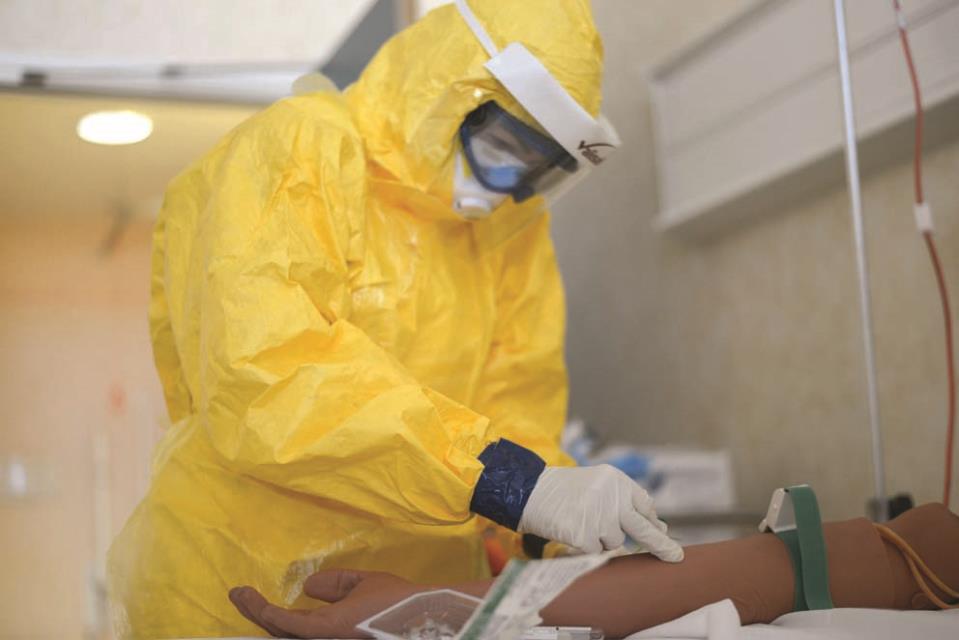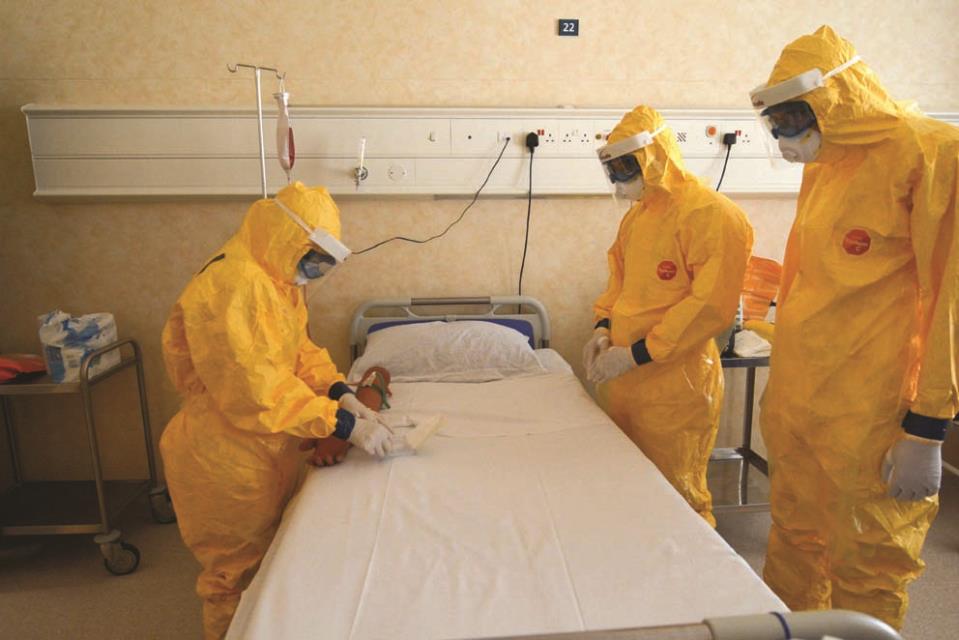Malta's Health Division was recently taken to task by the nursing union for saying that Malta is prepared, when hospitals did not have bio-suits available and that hospital staff lacked proper training to deal with Ebola cases.
In a letter to nurses, the union said that it is concerned on the "overconfidence" expressed by the Health Division in its press release when it comes to the hospitals' preparedness to tackle suspected cases.
But it turns out that Mater Dei has adopted a 'buddy' system which incorporates three 'layers' of safety to deal with suspected Ebola cases, apart from the fact that a number of drills are being held frequently.

Michael Borg, consultant at the Infectious Control Unit, told this newsroom that the system Malta is using was never dreamt of by hospitals in Texas, which is currently dealing with two cases of nurses who contracted Ebola.
One of the procedures Malta is using, which forms part of the 'buddy' system, same as used in diving, where a companion ensures that procedures are being followed at all times. Another procedure involves filming of the removal of the Ebola proof suits which is closely monitored by a central unit within Mater Dei Hospital. In addition, another person is assigned to the role of ensuring the suit is being removed correctly and per procedure.
This newsroom was exclusively invited by Mater Dei's management to tour the isolation areas identified to deal with suspected cases of Ebola. This newsroom also was also shown the decontamination chamber set up outside the hospital's emergency department. During our visit, a drill held in line with protocol, was in progress in the Infectious Disease Unit's isolated wards.
It is understood that the staff participating in the drills have all volunteered to undergo training and treat patients in the event suspected cases of Ebola surface in Malta.

'It's insulting to hear that Mater Dei is not properly equipped to deal with such cases', IDU consultant says
Dr Borg said that it is insulting to learn of health care workers who are not experts in the field of infectious diseases to make assertions such as the hospital is not adequately equipped to deal with Ebola suspected cases or the equipment provided to health care workers is of inferior quality.
He said that half the truth is worse than a lie.
According to Dr Borg, patients who are suspected to have Ebola would be transferred to the infectious disease unit through a corridor right away. The corridor leading to the IDU is barred for patients and certain medical care workers for safety reasons.
An irate sounding Dr Borg said: "With all due respect, some people do not have the expertise in this field to make certain assertions; what these individuals who speak out without have proper knowledge of the issue are not acknowledging is that blowers, for instance, which are worn by medical staff to treat patients suspected of having the disease, can be counterproductive at times, meaning it could hinder the desired goal.
He said that as happened in Texas, one of the nurses got infected due to the fact that she breached protocol. Investigators found that there were a number of "inconsistencies" in the type of personal protective gear that she wore and with the process used to put the gear on and remove it. In fact it resulted that on removing her gear, she touched her face with an infected glove she had on.
The MUMN claimed that the hospitals do not have blowers. In reply to this claim, he said that the more equipment one has to remove, the higher the risk of contracting the disease.
"Powered Air Purifying Equipment (PAPRs), the term used to what has been referred to as blowers by the union, are in fact available, but the issue here is that there is a misconception that unless we use blowers we are unsafe when dealing with such patients.

The more complex gear the higher the risk of self contamination, IDU consultant says
"The reality is that the use of too much equipment, or rather complex equipment, can be counterproductive; the key to staff protection is that protocols are not breached," Dr Borg said.
He explained that Ebola hasn't some jackhammer which digs into protective equipment and the disease is not airborne either; any protective equipment will protect staff attending to such patients.
"The more complex gear, the higher the risk of self contamination," he said.
Explaining further, he said that one has to assess the situation on a case by case basis.
"For instance, if a case will not be considered of a high risk in terms of spreading the disease, although the same gear is used at all times, the gear used in such instances is slightly less complex, opposed to a patient whose risk is higher," he said.
Turning to the recent case of suspected in Ebola in Malta, Dr Borg said that the IDU was fully mobilised immediately around this one patient and the patient was transferred to the isolation ward very efficiently.

'Buddy' system at Mater Dei
"We implemented what is referred to as the 'buddy' system. This entails positioning a person outside the isolated ward whose role is to ensure that those entering the room are fully equipped.
"The buddy also supervises the removal of the equipment of the person who would have just treated the patient while the whole process is also captured on CCTV and closely monitored by a central unit.
"So basically there are three layers of safety procedures Mater Dei has put into place, something Texas did not even dream about," the unit's consultant explained.
Decontamination tent was deflated for testing - Emergency Department consultant
The decontamination tent did not collapse but was deflated for 24 hours intentionally according to procedures, Michael Spiteri, Emergency Department consultant, said.
Dr Spiteri was referring to images which surfaced online showing the tent, set up a day before, partly deflated.
He said that a "lack of communication" led to certain misinterpretations.
"As the person who captured the image rightly saw, the tent, which is one of a number of systems to deal with Ebola cases, was deflated, but what he or she did not know is that the chamber was being tried and tested.
"The procedure involves deflating the tent for a whole day; the tent was not purchased now and is used for mass contamination; we decided to set it up in the light of what is happening around the world momentarily, as part of our ongoing mock excercises.
"On testing the chamber, we realised that a valve needed to be changed and therefore deflated it until the valve was changed," he said.

Screening at airports and inbound planes
Charmaine Gauci, director of Health Promotion and Disease Prevention Directorate, said that meetings were held between officials from her unit, other health officials and Malta International Airport representatives.
During the meetings, she said, a number of points of entry were identified.
MIA also facilitated meetings with officials representing various airlines using Malta as one of its ports of call.
"Following the meetings, one of the procedures we agreed on was that announcements would be made on each plane about to land in Malta whereby tourists who hail from certain countries are asked to contact help lines on their arrival.
"What follows next is a risk assessment of the passenger/s, which includes having their temperature taken.
"We stay in touch with such visitors for at least 21 days, if their stay is that long, since Ebola has an incubation period of 21 days," she said.
It results that three tourists have been monitored throughout their stay till now.
"The crew of each and every plane landing in Malta has also been instructed to approach passengers who look rather frail and on doing so to follow protocols. This involves alerting the air traffic control room, who in turn contacts a doctor.
"A risk assessment of the passenger is done while the plane is airborne; once there exists a suspected case of Ebola, the public health department's team and emergency department team scramble to the airport to assess the patient; the patient is then transferred accordingly," Dr Gauci said.
When asked if the disease is airborne and not only transmitted through body fluids, as has been suggested by a foreign expert, she said that those who contracted the infection did so after having had close contact with an infected person and nobody contracted the disease in any other way.

Temperature to rule out fever taken of all patients visiting hospital emergency
The hospital is taking all precautionary measures to deal with Ebola.
According to the experts who spoke to this newsroom, notices have been put up at the emergency department as a precautionary measure requesting visitors, who hail from certain countries, to inform the reception desk at once. This is being done as part of a filtering system to heavily decrease the chances of a person reporting a suspected case of Ebola physically to the department to spread the disease.
"It is a different situation when a person phones in to request assistance after suspecting he or she has Ebola to a case where a person walks into the emergency department and reports that he may have Ebola," experts said.
Besides the fact that the temperature of all patients visiting the department is being taken as a precautionary measure, including even being questioned over whether they have been abroad recently, visitors who come from certain countries or those who visited countries known to be of a high risk in terms of the spread of Ebola, are put through intensive questioning.
Footage Paul Jones, Photographs Jonathan Borg